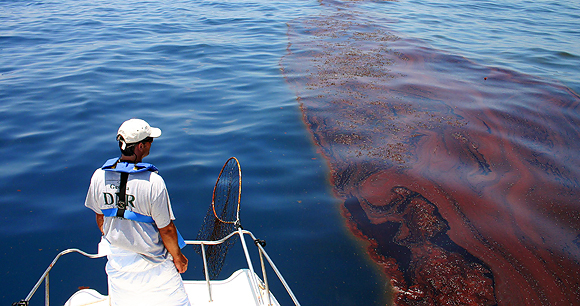
Though the oceans may seem endless, they are not infinitely resilient. Humans have impacted the oceans for millennia, but the past several centuries have seen a dramatic acceleration as we have industrialized our way of life, resulting in astonishing levels of pollution, even in uninhabited and remote areas.
Where once people thought waste could be dumped and absorbed by the seas with little lasting effect (“the solution to pollution is dilution” was one slogan), we now know that is not the case. As testament to this, one only has to observe the New Jersey-sized dead zone in the Gulf of Mexico—where agrichemicals washed in from the Mississippi River spawn algal blooms that choke off most marine life; or the massive Eastern and Western Pacific garbage patches, an interconnected, rotating pair of plastic trash concentrations in the North Pacific that kill marine mammals and birds who ingest or get tangled in the plastic; or the dead animals and tarry after-effects of the catastrophic oil spills in Prince William Sound, Alaska, the Gulf of Mexico, and numerous other places.
Human-Generated Noise Pollution
Physical contaminants such as plastic, agrichemicals, and oil aren’t the only form of pollution, however. Pollution can also include non-physical contaminants, such as noise. In large bodies of water, sound waves can carry with little attenuation (reduction) for miles. Sources of anthropogenic (human-generated) ocean noise include the use of explosives, oceanographic experiments, underwater construction, ship traffic, military active sonar, and airguns used for oil and gas exploration, drilling and shipping activities.
Such noise levels are increasing at an alarming rate, with some areas seeing a doubling of levels every decade for the past 60 years. Noise proliferation can pose a significant threat to marine ecosystems and a range of adverse effects in fish, marine mammals and other ocean creatures, from disturbance to injury and death. AWI and other interested groups are working to reduce ocean noise levels by urging nations to act together to protect marine living resources and ecosystems from the damaging effects of anthropogenic noise.
Other Forms of Pollution
Common man-made physical pollutants that reach the ocean include pesticides, herbicides, chemical fertilizers, detergents, oil, sewage, plastics, discarded fishing gear and other solid debris. Often, they are released far upstream. Many of these pollutants collect at the ocean's depths, where they are consumed by small marine organisms and introduced into the global food chain.
Solid waste like bags, foam, and other items dumped into the oceans from land or by ships at sea are frequently mistaken for prey and consumed by marine mammals, fish, and birds, often with fatal effects. Discarded fishing nets drift for years, ensnaring fish and mammals, leading to exhaustion, starvation, and slow death.